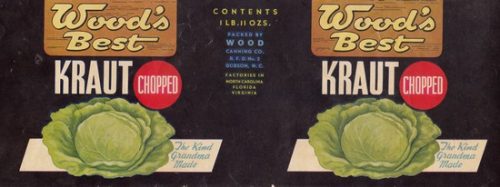“The large canning plant of J. G. Wood located at Copeland [outside Dobson] was totally destroyed by fire Thursday. The fire is thought to have started from a boiler room and was discovered about 9:30 p.m. The building was of wood construction and local means of stopping the fire were of no avail. Mr. Wood was operating the plant at full capacity and… had one carload of blackberries and one carload of kraut canned and ready for shipment which was lost. Also stored in the building were 700 barrels of kraut ready for canning….”
— From “Wood Canning Plant Burned” in the Mount Airy News (Aug. 24, 1945)
Wood Canning Co. seems to have survived the fire and was listed as recently as 1960 in the North Carolina Directory of Manufacturing Firms. But for half a century the state’s unchallenged kraut capital was Boone.

